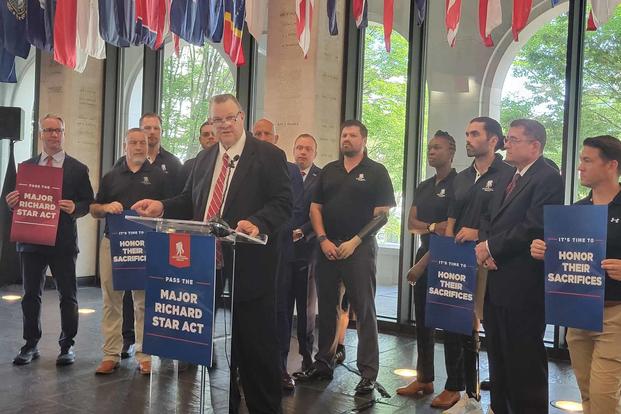Veterans with combat-related injuries rallied near the U.S. Capitol on Wednesday to urge lawmakers to finally act on a long-stalled proposal to allow all veterans full access to military retirement pay and Department of Veterans Affairs disability benefits.
Despite wide bipartisan backing, the Major Richard Star Act has languished for years, increasingly frustrating the veterans who are losing thousands of dollars in benefits that could help them support themselves and their families.
"Even before I medically retired, I got another job because I needed to provide for my wife, and at that time, we welcomed our first child right after I retired," said Ryan Kules, an Army veteran who lost his right arm and left leg in an improvised explosive device blast in Iraq in 2005. "So, I had a growing family and needed to get back into the workforce. And if I had had that additional income that I had earned, I would have been able to take some more time to adjust, but I didn't have a choice."
Read Next: Commander of New Hampshire Air National Guard Killed in Hit-and-Run Incident Near His Home
Kules, who now works at Wounded Warrior Project, was speaking to Military.com after a news conference across the street from the Capitol hosted by his organization and other veterans groups to urge Congress to move on the Major Richard Star Act.
Specifically, the organizations called for the measure to be added to the Senate's annual defense policy bill as an amendment when the chamber takes up the legislation in the coming weeks.
Right now, veterans with fewer than 20 years of service and a disability rating of less than 50% have their retirement pay reduced by a dollar for every dollar of disability pay they get.
Those rules mean an estimated 50,000 retirees are ineligible for concurrent benefits. The average offset was about $1,900 per month in 2022, according to the Congressional Budget Office.
The Major Richard Star Act would remove those restrictions so that all retirees with combat-related disabilities can collect their full retirement and disability benefits.
The bill's namesake was an Iraq and Afghanistan veteran who was forced to retire before 20 years of service after he was diagnosed with lung cancer he developed following burn pit exposure. Star died from cancer in 2021.
The bill has more than 300 co-sponsors in the House and more than 70 in the Senate. But it remains stalled despite past efforts to build momentum, in large part because the legislation would increase what's known as mandatory spending and congressional rules generally require any increases in mandatory spending to be balanced out elsewhere in the budget.
But Senate Veterans Affairs Committee Chairman Jon Tester, D-Mont., called the mandatory spending debate "an excuse" for inaction.
"This is the cost of war," Tester said at Wednesday's new conference. "You heard a number of folks come up here, you saw their battle wounds. If that shouldn't be mandatory spending, what the hell should?"
Tester said he and Sen. Mike Crapo, R-Idaho, the bill's other lead Senate sponsor, will introduce the measure as an amendment to the National Defense Authorization Act later this week.
It remains to be seen whether the amendment will be voted on, but veterans argued Wednesday that it's long past time for Congress to act.
"We've been talking about this for 19 years amongst the veterans, my brothers and sisters," said Danielle Green, an Army veteran who lost her dominant left arm in a rocket-propelled grenade attack in Iraq 15 months after enlisting. "I've been very fortunate over the past 20 years that I've been able to move forward with my life, but there are thousands, we have 53,000 veterans that earned these benefits that could benefit from this that have endured in hardship. So, we got to make this right, Congress."












